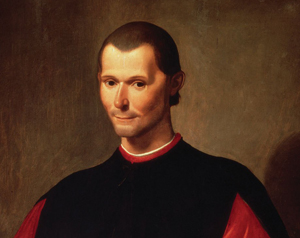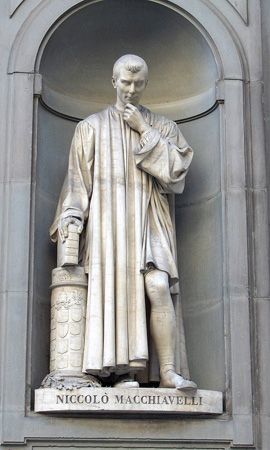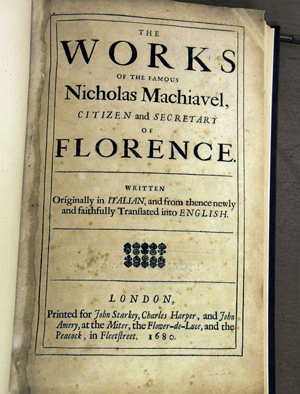| Profiles > Philosophy > Niccolo Machiavelli | |||||||||||||||
| Niccolo Machiavelli | |||||||||||||||
|
|||||||||||||||
| Early Life | |||||||||||||||
| At a young age, Machiavelli became a pupil of a renowned Latin teacher, Paolo da Ronciglione, from whom he learned grammar, rhetoric, and Latin. It is thought that he did not learn Greek, even though, at that time, Florence was one of the centers of Greek scholarship in Europe. In 1494, Florence restored the republic -- expelling the Medici family, who had ruled Florence for some 60years. Shortly after the execution of Savonarola, Machiavelli was appointed second chancery, a medieval writing office, which made him in charge of the production of official Florentine government documents. | |||||||||||||||
|
Shortly thereafter, he was also made Secretary of the Dieci di Libertà e Pace. In the first decade of the 16thcentury, he carried out several diplomatic missions -- most notably to the Papacy in Rome, in the Italian states. In 1502-1503, he witnessed the brutal reality of the state-building methods of Cesare Borgia (1475-1507)and his father, Pope Alexander VI, who were then engaged in the process of trying to bring a large part of central Italy under their possession. Other excursions to the court of Louis XII and the Spanish court influenced his writings, which appear in The Prince and several other non-fiction works. In 1502, Machiavelli married Marietta Corsini, who bore him four sons and two daughters. His grandson, Giovanni Ricci, is credited with saving many of Machiavelli's letters and writings. Between 1503 and 1506, Machiavelli was responsible for the Florentine militia. He distrusted mercenaries and instead | ||||||||||||||
| staffed his army with citizens, a policy which proved to be successful many times over. Under his command, Florentine citizen-soldiers defeated Pisa in 1509. That being said, Machiavelli's success did not last. In August 1512, the Medici, helped by Pope Julius II, used Spanish troops to defeat the Florentines at Prato; although, many historians argued that this was due to Piero Soderini's unwillingness to compromise with the Medici who were holding Prato under siege. In the wake of the siege, Piero Soderini resigned as Florentine head of state and left. Hence, the Florentine city-state and republic was dissolved. Machiavelli was deprived of his office in 1512 by the Medici. In 1513, the Medici accused him of conspiracy against the Medici family and had him imprisoned. Despite having been subjected to torture with rope -- where the prisoner is hanged from his bound wrists, from the back, forcing the arms to bear the body's weight, thus dislocating the shoulders -- he denied involvement, and was released after three weeks. | |||||||||||||||
|
|||||||||||||||
| Pope Clement VIII condemned The Prince for its endorsement of rule by deceit and fear. One excerpt from the book reads: "Since love and fear can hardly exist together, if we must choose between them, it is far safer to be feared than loved."In addition to The Prince, Machiavelli wrote the treatise On the Art of War (1521), among others, and several poems and plays, including the satirical Mandrake (1524). Meanwhile, Discourses on the First Ten Books of Titus Livy, often referred to as Discourses or Discorsi, is nominally a discussion regarding the classical history of early Ancient Rome, though it strays far from this subject matter and also uses contemporary political examples to illustrate points. Machiavelli presents it as a series of lessons on how a republic should be started and structured. It is a larger work than The Prince, and it more openly explains the advantages of republics, while containing similar themes. | |||||||||||||||
| List of other political and historical works by Niccolo Machiavelli are as follows: | |||||||||||||||
|
Discorso sopra le cose di Pisa (1499) Del modo di trattare i popoli della Valdichiana ribellati (1502) Descrizione del modo tenuto dal Duca Valentino nell'ammazzare Vitellozzo Vitelli, Oliverotto da Fermo, il Signor Pagolo e il duca di Gravina Orsini (1502) - A Description of the Methods Adopted by Duke Valentino when Murdering Vitellozzo Vitelli, Oliverotto da Fermo, the Signor Pagolo, and the Duke di Gravina Orsini Discorso sopra la provisione del danaro (1502) - A discourse about the provision of money Ritratti delle cose di Francia (1510) Ritracto delle cose della Magna (1508-1512) - Portrait of the affairs of Germany Dell'Arte della Guerra (1519-1520) - The Art of War, high military science Discorso sopra il riformare lo stato di Firenze (1520) - A discourse about the reforming of Florence Sommario delle cose della citta di Lucca (1520) - A summary of the affairs of the city of Lucca Vita di Castruccio Castracani da Lucca(1520) - The Life of Castruccio Castracani of Lucca, a short biography Istorie Florentine (1520-1525) - Florentine Histories, an eight-volume history book of the city-state, Florence,commissioned by Giulio di Giuliano de' Medici, later Pope Clement VIIFictional works: In addition to his political writings, Machiavelli also translated classical works, and was a playwright (Clizia, Mandragola), a poet (Sonetti, Canzoni, Ottave, Canti carnascialeschi), and a novelist (Belfagor arcidiavolo). Some of his other works are as follows: Decennale primo (1506) – a poem Decennale secondo (1509) – a poem The Woman of Andros (1517) – a classical comedy Mandragola (1518) – The Mandrake – a five-act prose comedy Clizia (1525) – a prose comedy Belfagor arcidiavolo (1515) – a novel Asino d'oro (1517) – T he Golden Ass is a poem, a version of the classic work by Apuleius (second century) Frammenti storici (1525) – fragments of stories |
|||||||||||||||
|
|||||||||||||||
|
Credits
http://en.wikipedia.org/wiki/Niccol%C3%B2_Machiavelli http://plato.stanford.edu/entries/machiavelli http://www.biography.com/people/niccol%C3%B2-machiavelli-9392446#synopsis&awesm=~oDJUX8XmELhtqv http://www.historyguide.org/intellect/machiavelli.html |
|||||||||||||||
| 1 The Gonfaloniere was a highly prestigious communal post in medieval and Renaissance Italy, notably in Florence and the Papal States. | |||||||||||||||











